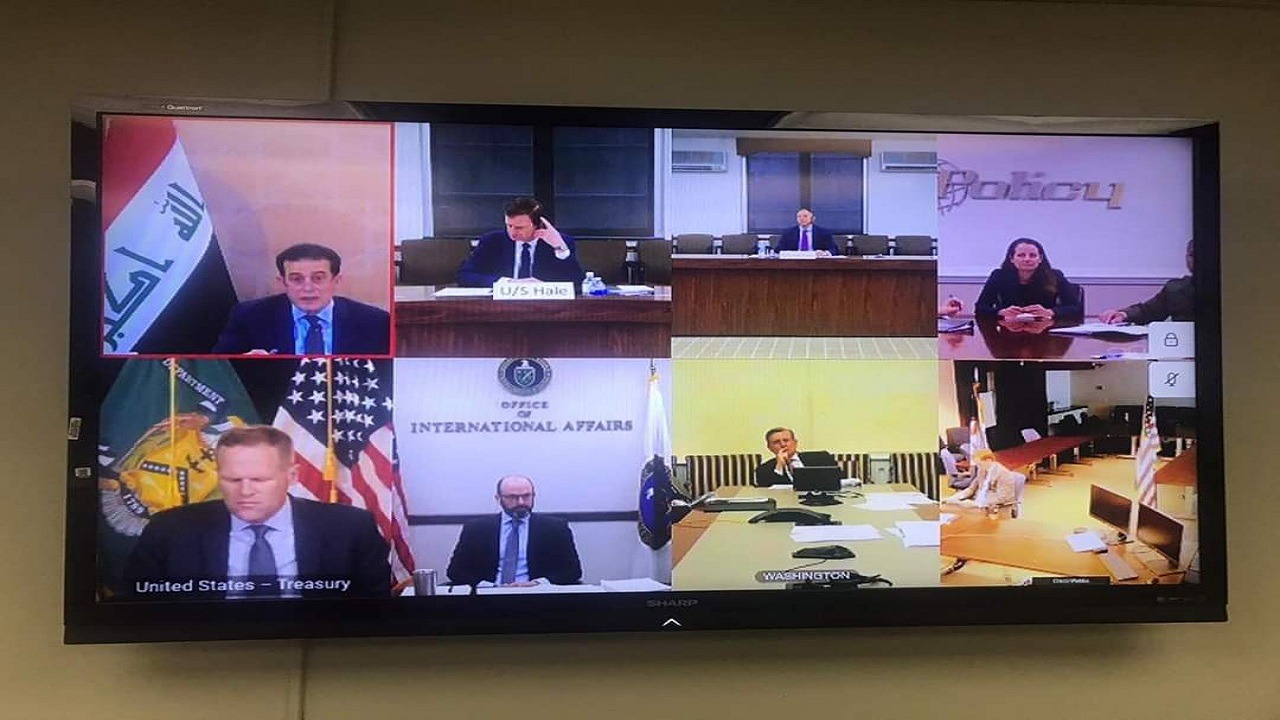The first round of strategic talks between the United States and Iraq on a security agreement reached a few years ago between the two countries was held on Thursday. The talks took place in the form of a video conference between the US and Iraqi delegations, with talks between officials and experts on both sides, led by Abdul Karim Hashem Mustafa, Iraq’s deputy foreign minister, and on behalf of the US delegation, David Hill.
The most important issues discussed in the two countries’ strategic talks were security, the economy, energy, political affairs, the fight against terrorism and other issues. Several important points that the two sides discussed in the talks, with Iraqi Prime Minister Mustafa al-Kazemi confirming them as the outcome of the talks, emphasized the US principle of national sovereignty and Iraqi national interests, and the withdrawal of US troops from Iraq. Of course, the main issue was the reduction of US forces, and at the same time the US side has emphasized that it will accept the resolutions and all the legal bases that have been approved by the Baghdad parliament within the framework of the withdrawal of its troops from Iraq. These have been the subject of several hours of consultations between the United States and Iraq.
But the issue of a security agreement between the United States and Iraq is a very fundamental issue that needs to be addressed. First of all, there is the question of what is essentially the subject of the US-Iraqi security agreement and what will be included.
If we want to discuss the background of these negotiations, we have to go back to the US-Iraqi security agreement in 2008, at which time the agreement was drafted in almost 30 articles and approved by both countries. The 30 articles in the 2008 Security Agreement cover a variety of topics that can be categorized into three groups; first is cooperation in the field of defense and security; second is the preservation of Iraq’s sovereignty, unity and territorial integrity, and third is mutual respect for the sovereignty of both countries. The first article of the agreement also emphasized the temporary presence of US forces in Iraq and the timing of their pull-back. The second article of the agreement outlined the framework for the activities of the US military, civilian forces, and American companies and contractors in Iraq.
One of the most controversial issues at the time was Article 12 on the rule of law and the legal issue of American forces. At the time, the United States agreed to hand over part of the investigations into crimes committed by American troops to Iraqi courts out of respect for Iraq’s laws and sovereignty.
Another issue is that in recent years, criticism of the continued presence of the United States in Iraq and the nature of its activities by some Iraqi groups has intensified. The Iraqi parliament convened an emergency meeting following the assassination of Sardar Qassem Soleimani and Abu Mohandes Mehdi by US troops and approved a resolution calling for the withdrawal of US troops from Iraq at the request of the government. After that, there was talk of negotiations and a new agreement between the United States and Iraq, which is why the first round of strategic talks between the two countries took place on Thursday.
Regarding the timing of the withdrawal of US troops from Iraq; Whether the withdrawal will involve all forces or it will only cut the number of troops, as well as the status of US bases in Iraq, has not been discussed in the media so far, and only general information about the talks between the two sides and the resulting agreement has been released the most important parts of which were mentioned above.
The new talks on Thursday also reaffirm the same security agreement that was signed in 2008 between the two sides, but the question is what is the difference between those talks and the recent agreement and negotiations? In fact, it should be noted that since then, about 12 years have passed since then, and the Iraqis have had to reconsider the agreement between the two countries. Over the past year or so, however, US challenges in Iraq have intensified, and opposition to the presence of US forces has intensified. Recent talks have focused on reducing the number of US troops in Iraq and are set to begin in the coming months. But because the phrase “reduction of forces” has been used, this can be interpreted.
Ultimately, the question that has drawn the attention of observers is how the future of US-Iraqi military, security or economic cooperation will be pursued. Recent talks have even focused on economic issues, and it is clear that Washington has plans for Iraq’s future. Part of the US program focuses on economic cooperation in various fields, including energy, reconstruction, and the presence of American companies in Iraq. As for military issues, there is no doubt that Washington does not want to withdraw all its forces from Iraq.
Therefore, the question on the future of Washington-Baghdad relations and media reports on the possibility of full US troop withdrawal and the nature of these relations will depend on the vigilance of Iraqi officials not to be deceived by America’s promises. This will become clear in the next few rounds of strategic talks between the two sides.










0 Comments